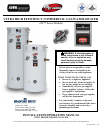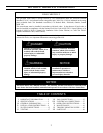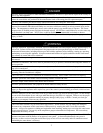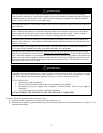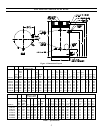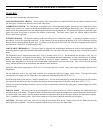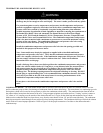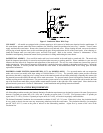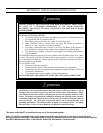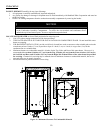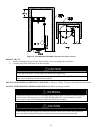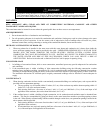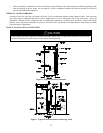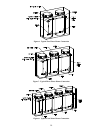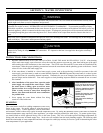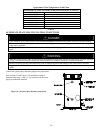
8
Figure 2. Condensate Elbow With Trap
CLEANOUT – All models are equipped with a cleanout opening to aid in removal of hard water deposits from the tank bottom. If
this water heater operates under hard water conditions, the following should be performed at least every 3 months: Turn off water
supply and drain the water heater. Remove the cleanout jacket cover and tank cover. When cleaning the tank, care must be taken to
avoid trying to break deposits loose as this could damage the glass lining and shorten the life of the water heater. After cleaning, re-
install the cleanout tank cover and jacket cover, and refill with water. Refer to the section, “Section X: Maintenance” in this
Installation and Operating Instruction manual for the procedures for filling and draining the water heater.
SACRIFICIAL ANODES – Four sacrificial anode rods have been installed in the tank head to extend tank life. The anode rods
should be inspected periodically for corrosion and replaced when necessary to prolong tank life. Water conditions in your area will
influence the time interval for inspection and replacement of the anode rods. The use of a water softener may increase the speed of
anode consumption. More frequent inspection of the anodes is needed when using softened (or phosphate treated) water. Contact the
installing contractor, or service provider that installed the water heater or the manufacturer listed on the rating plate for anode
replacement information.
POWERED ANODE SYSTEM (399,999 BTU/HR. (117.2 kw) MODELS ONLY) – Two powered anodes and one magnesium
anode rod are used on models with input ratings of 399,999 Btu/hr (117.2 kw). The powered anode system provides corrosion
protection to the tank by supplying a low voltage current to the titanium anode rods and then periodically comparing this current with
the potential between the anode rod and tank wall to make corrections. The powered anode system is designed to extend the tank life
without requiring anode rod replacement. The powered anode system consists of two titanium powered anode rods located in the front
top of the water heater tank and a powered anode control module located on the right side of the control panel. More details on the
powered anode system are in “Section X: Maintenance” in this Installation and Operating Instruction Manual.
DISHWASHING MACHINE REQUIREMENTS
All dishwashing machines meeting the National Sanitation Foundation requirements are designed to operate with water flow pressures
between 15 pounds per square inch (103.4 kPa) and 25 pounds per square inch (172.4 kPa). Flow pressures above 25 pounds per
square inch (172.4 kPa), or below 15 pounds per square inch (103.4 kPa), will result in improperly sanitized dishes.
The National Sanitation Foundation also recommends circulation of 180°F (82.2°C) water. Where this is done, the circulation should
be very gentle so that it does not cause any unnecessary turbulence inside the water heater. The circulation should be just enough to
provide 180°F (82.2°C) water at the point of take-off to the dishwashing machine. Adjust flow by means of the valve in the
circulation line.



